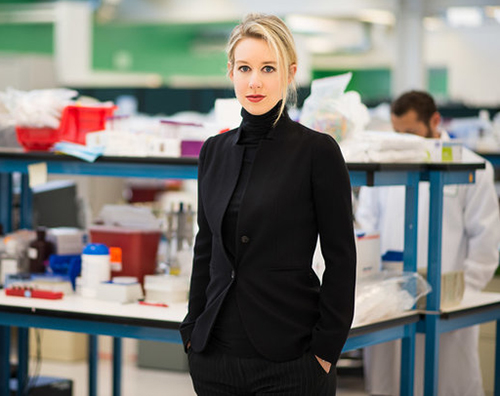Former CEO Elizabeth Holmes now awaits March 9 court date on federal fraud charges that include reporting false medical laboratory test results on some patients
Clinical laboratory leaders have watched with keen interest the federal criminal proceedings against disgraced Theranos founder and former CEO Elizabeth Holmes, whose blood-testing company lost nearly $1 billion of investors’ money before dissolving in 2018.
In a recent CNBC interview, John Carreyrou, the Wall Street Journal (WSJ) investigative journalist who first broke the Theranos story in 2015, contended that the once-high-flying Silicon Valley startup could have paid back investors on a pro-rata basis, but that the company opted to use its dwindling cash to challenge lawsuits.
“If you rewind to October 2015, when I finished, when I published my first investigative story on Theranos, the company still had $400 million in the bank and it could have called it quits then,” Carreyrou said in the interview. “And Elizabeth Holmes could have apologized to investors, to patients, to everyone she had misled and returned that money to shareholders on a pro-rata basis.”
Theranos Scandal Breaks Wide Open
Carreyrou’s nearly year-long Wall Street Journal investigation into Theranos helped bring down the venture capital darling that had achieved a $9 billion private valuation before crumbling under the weight of fraud allegations. Dark Daily and our sister publication The Dark Report (TDR) covered in detail the allegations against and investigation into the embattled blood test company in dozens of e-briefings and TDR articles starting in 2015.
In fact, The Dark Report was first to publish the news that Theranos had ceased using its finger-stick collection method in Phoenix as early as April 2015. (See TDR, “Theranos: Many Questions, But Very Few Answers,” April 20, 2015.) At that time, Theranos declined to respond to The Dark Report’s requests for comments.
Theranos had built its superstar reputation on the backs of a revolutionary finger-prick blood testing system, which Holmes promised could diagnosis diseases ranging from diabetes to cancer with just a few drops of blood. But an in-depth investigation into hoopla surrounding the company’s breakthrough technology by Carreyrou and other reporters at the Wall Street Journal revealed it was based on false test results and phony claims to investors and companies, such as Walgreens, which had planned to feature the technology in their retail clinics.

In 2016, Theranos received sanctions from the Centers for Medicare and Medicaid Services (CMS), which included revocation of the company’s CLIA certificate and sanctions against Holmes and other company officials that prohibited them from owning or operating a medical laboratory for two years. Soon afterward, Theranos laid off 340 workers, closed its laboratory operations, and shuttered its wellness centers to “focus on an initiative to create miniature medical testing machines,” the New York Times reported.
When Theranos was finally dissolved in September 2018, Carreyrou reported that the company had an estimated $5 million in cash to distribute to unsecured creditors. All told, Carreyrou estimates Theranos’ investors, which included such big names as News Corp Executive Chairman Rupert Murdoch, Bechtel Group Chairman Riley Bechtel, and US Education Secretary Betsy DeVos, lost nearly $1 billion.
While Holmes’ star was fading, Carreyrou’s fame was rising with the 2018 publication of his best-selling book on Theranos’ downfall, titled, “Bad Blood: Secrets and Lies in a Silicon Valley Startup.”
Theranos’ Final Chapter
Today, Holmes is preparing to stand trial on a dozen federal wire fraud and conspiracy to commit wire fraud charges at the US District Court in San Jose, Calif., where jury selection is slated to start on March 9, 2021, amid COVID-19 pandemic safety precautions.
According to the Mercury News, Holmes faces maximum penalties of 20 years in prison and a $2.75 million fine, plus possible restitution. Carreyrou does not expect Holmes to seek a plea deal.
“I think that the chances of that are pretty unlikely. From what I hear, she’s telling her friends and her entourage that she’s actually looking forward to her day in court and she thinks that the real story—her version of the story—will come out at trial,” he told CNBC. “And so, she’s actually putting on a cheerful face with people she knows, and people have seen her recently and are saying that she’s looking forward to see this go to a jury.”
While the final chapter of this story will be written by a federal court jury, clinical laboratory leaders likely will want Holmes to face maximum penalties if found guilty of all charges. The deceptive scientific and business practices Theranos allegedly engaged in caused many headaches for the clinical lab directors of hospitals and health networks as their CEOs asked why the “cheap and fast” Theranos testing system could not be used instead of traditional, more expensive testing methods.
Theranos also financially damaged investors who might otherwise have gained capital and continued to invest in more credible startups of diagnostic companies and clinical laboratories.
—Andrea Downing Peck
Related Information:
Theranos Could Have Paid Back Investors Years Ago, But Used Money to Ward Off Lawsuits: Experts
Theranos Founder Elizabeth Holmes May Seek ‘Mental Disease’ Defense in Trial, Document Shows
Theranos to Close Labs and Lay Off 340 Workers
Blood-Testing Firm Theranos to Dissolve
Theranos Founder Holmes’ Trial to Go Ahead with Socially Distanced Jury: Judge
Elizabeth Holmes Wants to Block Jurors from Hearing About Her Luxurious Lifestyle as Theranos CEO




